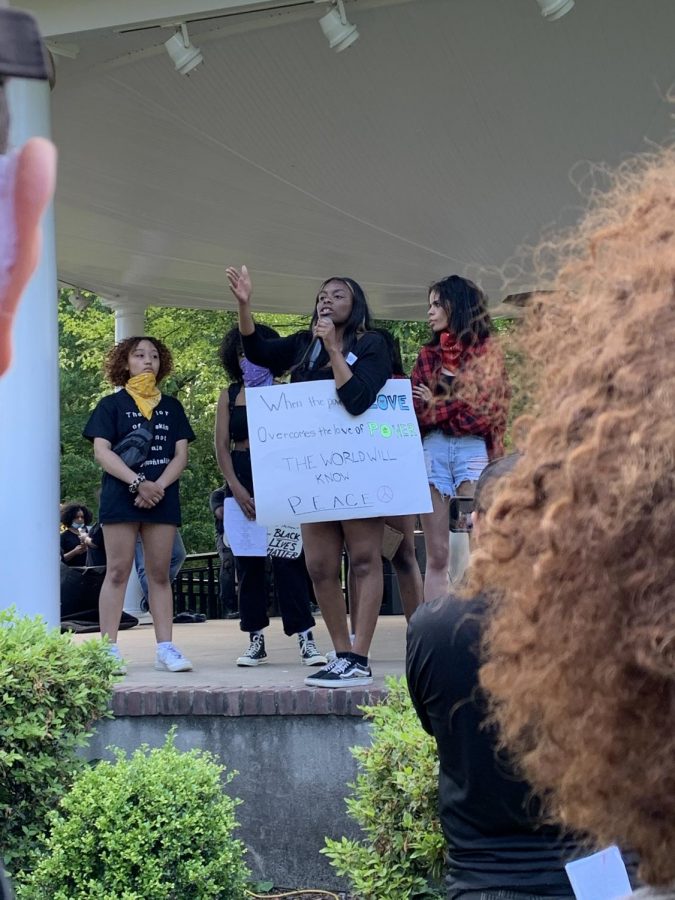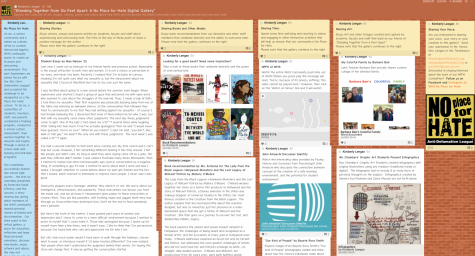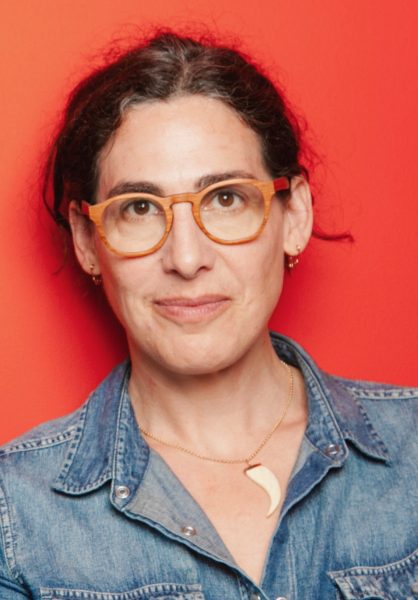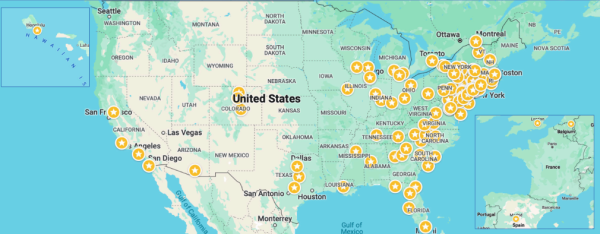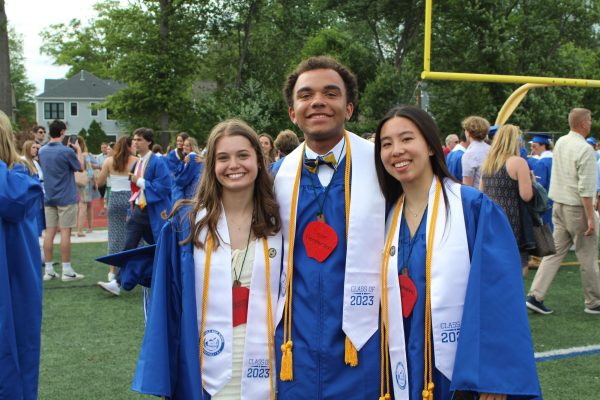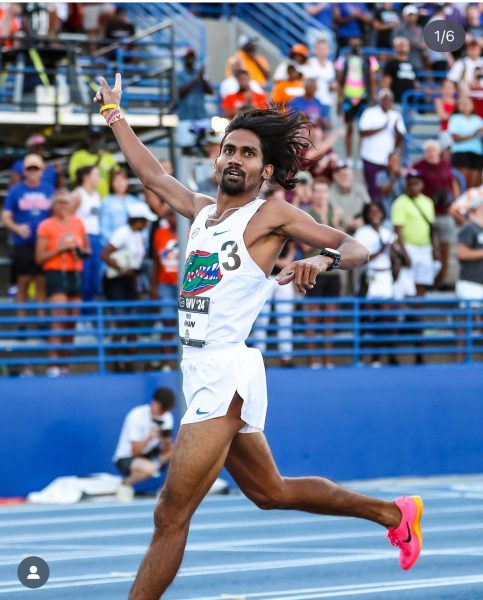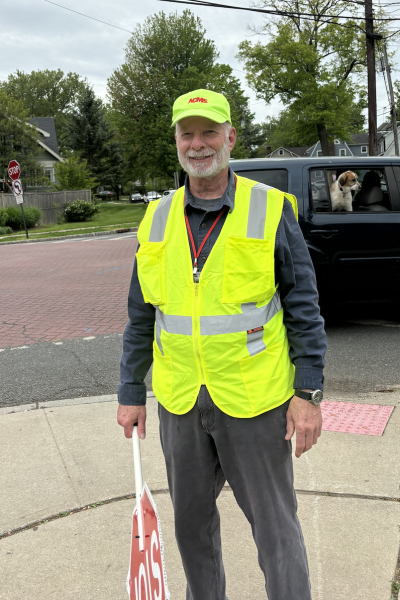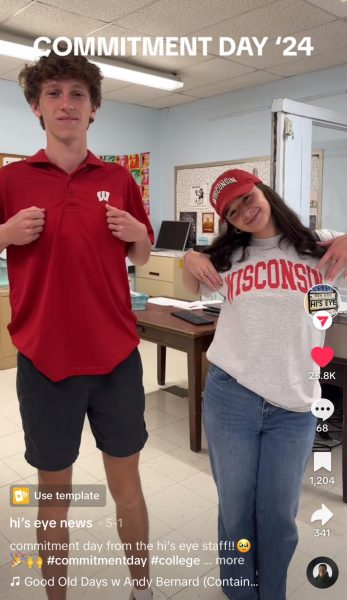WHS students lead peaceful BLM protest

WHS Junior Nala Scott and other WHS students, in conjunction with the No Place for Hate Committee, led a protest on June 7 in Mindowaskin Park following the murder of George Floyd. Floyd was killed on May 25 when police officer Derek Chauvin put his knee on Floyd’s neck for over eight minutes. When Scott heard the news of Floyd’s death, she decided she could not sit idly by as another African American was killed by officers at a seemingly routine police stop.
Scott is a member of the No Place for Hate Committee at WHS, a program created by the Anti-Defamation League that helps students understand and recognize differences within their community. Scott and senior Morgan Rollins, another member of the No Place for Hate Committee, organized the protest. At the beginning of the protest, Scott and Rollins gave opening remarks and then held an 8 minute and 46 second moment of silence, the amount of time Chauvin kneeled on Floyd’s neck. During these 8 minutes, the approximately 2000 protestors took a knee, and some held up signs or raised a fist.
New Jersey Governor Phil Murphy, Westfield Mayor Shelley Brindle and Representative Tom Malinowski followed the moment of silence with speeches. In an exclusive interview with Hi’s Eye immediately before the protest began, Murphy said, “Nala Scott, a rising senior from Westfield High School wrote me a personal note to ask me to come. She said she is a black woman who too often finds herself alone and isolated, and I said immediately to my team that I wanted to stand with her and her classmates.”
All three politicians outlined ways they are going to help create change. During his speech, Malinowski said, “I can speak for the United States House of Representatives. Starting this week, you are going to see legislation introduced within the House of Representatives and we will pass it within the month to begin real police reform within this country.” We know we must do better, and now it is the time to push forward with unwavering courage and fortitude to ensure that we never have to tell another six-year-old girl like Gianna Floyd that her daddy died because he couldn’t breathe. — Pam Wright
In regards to New Jersey, in his Hi’s Eye interview, Murphy said, “We have a long way to go, but we have already made a lot of steps. I just nominated a black woman to the [New Jersey] Supreme Court on Friday. Two days earlier, I named an African American woman as the head of our policy unit. We have also done an enormous amount of work on community policing.”
After the politicians spoke, members of the Westfield and New Jersey communities took their turns speaking. Danny Reyes and Pam Wright spoke about their experiences as African Americans in New Jersey. Reyes specifically was a part of the New Jersey Four: four black men who, on their way to basketball tryout in North Carolina, were shot at eleven times by the police when pulled over for an apparent traffic violation on the New Jersey Turnpike in 1998. The New Jersey Four helped create police reform that included adding a body camera to police uniforms.
Wright, a black mother of three living in Westfield and a social worker, noted at the beginning of her speech that she originally did not want to speak. However, she felt obligated to call out social injustices as a social worker. Wright continued her speech by calling out American society saying, “We are here because we have reached a tipping point in America. We know we must do better, and now it is the time to push forward with unwavering courage and fortitude to ensure that we never have to tell another six-year-old girl like Gianna Floyd that her daddy died because he couldn’t breathe.”
After Wright spoke, students from WHS delivered speeches. Student speakers included seniors Brandon Vazquez, Kunle Badmus and Madison Bradford, juniors Michaela Hobson and Jordan Ortiz, and sophomores Matthew Swenson and Melissa Didario. Badmus said that he felt inspired to speak at the protest. “I felt as though my experience with the topics at hand made me well equipped to deliver a speech using such a large platform.”
Finally, Scott gave her own speech and when she finished, she received the loudest applause of the day. Throughout her speech, Scott recalled her own experiences as an African American in Westfield to explain to the majority white audience what it was like to be black in Westfield. At one point in her speech, Scott spoke about a time where she saw a boy kick a soccer ball into a goal while screaming the n-word. According to Scott, when she reported the boy to the principal, the principal told him not to do it again. “And guess what?” Scott asked, “He did it again. And what did the principal say again? ‘Don’t do it again.’ That is not going to make [the students] learn at all.”
In response to Scott’s comments, Superintendent Dr. Margret Dolan told Hi’s Eye, “We take any report of hateful speech or hateful acts seriously, and administrators have reached out to students to better understand statements that were made [during the protest]. It is important to me that our schools be a place where all students can feel safe.”
Building upon this personal story, Scott was also critical of the Westfield education system as a whole. In her speech, Scott said, “You need to educate these children so they know what their actions are doing.” Nala Scott, a rising senior from Westfield High School wrote me a personal note to ask me to come. She said she is a black woman who too often finds herself alone and isolated, and I said immediately to my team that I wanted to stand with her and her classmates. — New Jersey Governor Phil Murphy
Scott also spoke about what was being taught in our classrooms. She said, “I am tired of hearing about George Washington every single year. I heard the same name over and over again. Do you think that teaching kids about Martin Luther King and Rosa Parks for two years is going to make them realize what you’re doing is wrong? It’s two people!”
Scott elaborated on this issue in an interview with Hi’s Eye, saying we must “really get in-depth about the Black American history, which is still American history.”
Aside from education, members of our community are also looking for ways to make a change. In an interview with Hi’s Eye, Brindle outlined ways she was working to help eliminate racism in Westfield. “Before George Floyd and before COVID-19, we had just instituted a human relations advisory council which came out of some of the anti-Semitism and racism we have seen around town. And then honestly the debate about the curriculum at the school about that class.”
The class Brindle referenced is the new elective being offered next year titled Power, Privilege and Imbalance in America. According to Dr. Dolan, “We have worked hard to improve our curriculum and to provide students an educational experience that explores questions of freedom, justice, equality, and citizenship as well as prejudice, race, diversity, and human rights. However, we are always looking to do better and we must. This fall, multiple sections of a new course at Westfield High School will be available to juniors and seniors to educate and foster discussion among students about the history of minority groups in the United States.”
Protesters still admit that there is a long way to go and that racism has been going on for a long time. One dad attending the protest said, “My first experience with this kind of thing was back in ’92 with the Rodney King riots and the Rodney King verdict and the fact that more black people are being killed by police.”
However, some protestors were optimistic that things are changing, even though more work needs to be done. Brindle said, “We can look at policy, we can look at education, we can look at dialogue, we can look at diverse positions in power, even who we are representing to our local office. I think we need to leverage the momentum of what we are seeing today to pull people in.”
While speeches varied throughout the protest, one underlying message was consistent: black lives matter and change must occur. Speaking to protestors, Wright said, “Now is when we begin to address the issue of systemic racism across our institutions, and begin to extract it, like the cancer it is!”

